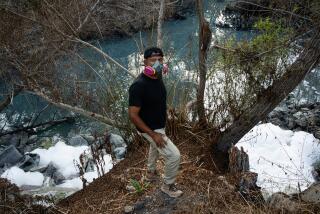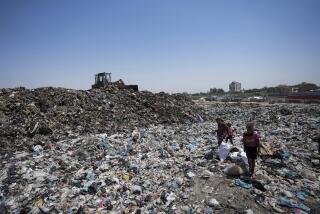Holy Land Plagued by Foul Water, Halo of Smog
- Share via
HAIFA, Israel — In the decades that Israelis were kept busy building and defending their nation, they had little time for the environment. As a result, the Holy Land today is not blessed with clean air and water.
The Jordan River, where Jesus was baptized, is a muddy stream with little natural life left, and sewage is seeping into the biblical Sea of Galilee.
In this modern port city, residents are sometimes trapped indoors by foul-smelling clouds of sulfur dioxide spewed from refineries and other industrial plants.
Although some types of pollution are near catastrophic proportions, most Israelis remain apathetic. Reports of mass fish poisonings are met with indifference, and Israelis litter their streets and beaches with soda cans, empty cigarette packs and plastic bags.
“The attitude of most people is that the main purpose is to build the country and defend it,” said Uri Merinov, head of the Environmental Protection Service.
“The environment is not a political issue in Israel. There is no real public movement that demands environmental protection like in the United States or Europe.”
Israel does not have such severe problems as acid rain and ocean dumping that have awakened environmental consciousness elsewhere in the world.
It was not until last December that the government formed an Environment Ministry to gather under one agency enforcement powers that had been scattered in 10 different ministries.
Environment Minister Roni Milo is still fighting with the agriculture and health ministers over their refusals to surrender authority.
In the meantime, polluters continue to dump toxic wastes and send dangerous fumes into the air.
One of the worst-hit areas is Haifa Bay, site of more than 2,000 industrial plants, including a power plant and oil refineries that spew sulfur dioxide, a colorless gas blamed for a host of health problems, including respiratory troubles.
“Our old people are suffering from headaches and breathlessness,” said Erika Frasch, head nurse at the Iben Ezer Nursing Home, which has 30 patients and is about two miles from Haifa’s industrial area. “Myself, I feel like I’m poisoned. There’s smoke all over the city.”
On April 30, the sulfur dioxide content in air increased after a refinery filter broke down. With a dirty gray cloud hovering over the city, the elderly and those suffering from respiratory or heart problems were told to stay indoors. Schools canceled outdoor gym classes.
The accident dramatized Haifa’s air problems, caused by spotty compliance with already lax emission standards.
“In April, we measured violations on 10 days,” said Zvi Fuhrer of the Haifa Town Assn. for Environmental Protection.
He noted that the heavy fuel used in Israel’s power plants and refineries contains 3.2% sulfur, in contrast to a maximum of 0.5% permitted in Los Angeles and 0.3% in New York.
The Environment Ministry wants tougher standards, but the Energy Ministry, which runs the power plant and the refineries, argues that using low-sulfur oil and installing scrubbers would make the plants unprofitable.
Although air pollution is a problem mainly in the industrialized coastal strip, deteriorating water quality affects nearly all 4.2 million Israelis.
Water pollution has been causing dysentery outbreaks in Haifa and the Western Galilee since 1985. In hot weather, health authorities frequently urge Israelis to boil drinking water.
In the Sea of Galilee, which provides about 40% of Israel’s drinking water, “there has been a gradual but continuous deterioration in the quality of the water,” State Comptroller Miriam Ben Porat wrote in her 1989 report.
She noted that in Israel, water is not filtered and carries sediments that are a fertile breeding ground for germs.
A major pollutant is sewage that overflows or is pumped backed into the water system before it has been treated sufficiently, said Avner Adin, head of the Department of Environmental Sciences at the Hebrew University of Jerusalem.
“There are no specific regulations on what sewage quality should be before it goes into a stream or river,” he said.
One of the rivers affected is the Jordan.
Adin, describing its condition as “not good,” said both Israel and Jordan have diverted water for irrigation, lowering the river’s level and raising the salt concentration. Sewage and other contaminants also seep into the river in the north, he said.
Merinov blamed Israel’s environmental problems mainly on unchecked industrial development.
But he said public indifference left over from the ghettos of Europe and North Africa--where people had no control over the environment outside their own homes--was responsible, too.
“One of our major efforts is to change this attitude, but it’s going to be quite difficult,” Merinov said.
More to Read
Sign up for Essential California
The most important California stories and recommendations in your inbox every morning.
You may occasionally receive promotional content from the Los Angeles Times.













